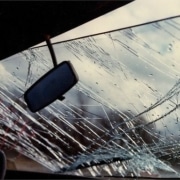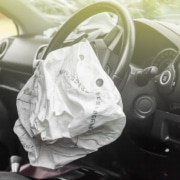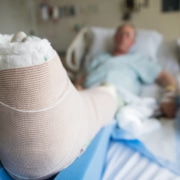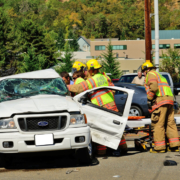Who Can be Held Responsible for Lynchburg Personal Injuries?
If you have been injured in a Lynchburg personal injury accident, you are probably overwhelmed. Those who suffer serious personal injuries often have to take significant time off of work. You may be wondering how you will pay all of your medical bills and your household bills while you are unable to work due to your injuries. The first step in seeking compensation for your injuries is determining who is legally responsible or liable for your damages.
At Straw Law Firm, our experienced Lynchburg personal injury attorneys can evaluate your case and help you determine who is at fault. Determining who is at fault depends on which type of personal injury happened. Below we will discuss the most common types of Virginia personal injury law cases.
Motor Vehicle Accidents
Car accidents can be straightforward, but it can be complicated to determine who is at fault in some cases. Under Virginia law, drivers owe other drivers, pedestrians, and passengers a duty to use reasonable care when driving. The driver whose negligence caused the accident is at fault for the accident. Virginia follows the legal principle of contributory negligence. Only a few states follow this legal doctrine.
Under the contributory negligence doctrine, courts look at the damage caused by both parties involved in motor vehicle accidents. If the court determines that you were at fault for the car accident, even if you were only 1% at fault, you would not be able to bring a personal injury lawsuit against the other driver.
The contributory negligence law is considered harsh by many people, and one of the reasons victims of car accidents need to speak to a lawyer as soon as possible. If the other driver proves that you were at fault, even to a small degree, you will not be able to recover. At Straw Law Firm, our lawyers will help advocate for your rights by investigating your accident and helping you prove that the other party was at fault for your injuries.
Proving Fault in Negligence Accidents
If you have suffered an injury in another type of accident, you will need to prove that the defendant’s intentional behavior, negligence, or recklessness caused your injuries. When someone’s negligence or carelessness causes your injuries, that person is financially responsible for your resulting damages. Plaintiffs will need to prove the following elements in order to secure damages for their personal injuries:
- Duty – You must prove that the defendant owed the you a legal duty to act reasonably under the circumstances
- Breach – The defendant’s action or inaction breached his or her duty of care
- Causation – The defendant’s action or inaction caused your injuries
- Damages – You experienced losses that require compensation
Premises Liability Accidents
When an accident or injury happens on someone else’s property, the victim may bring a lawsuit against the property owner or manager. The owner or occupier of a property can be held liable for specific injuries and accidents that occur on the property. All property owners have a legal duty to make sure their property is reasonably safe so that other people who come onto the property will not suffer any injuries. This area of personal injury law is called “premises liability.” Common premises liability accidents include the following:
- Becoming injured in an amusement park
- Slipping and falling on a public sidewalk
- Swimming pool accidents
- Dog bites
- Escalator and elevator accidents
- Injuries caused by defective conditions on the premises
- Dog bites
- Flooding or water leaks
- Fires
- Inadequate building security
In premises liability lawsuits, the accident victim brings a lawsuit against the property owner or manager. Whether the accident happened in someone’s home, in a retail store, on a sidewalk, or in a commercial building, you can likely bring a lawsuit against the owner or operator of the building or land if you have been injured. If you suffered an injury on a public sidewalk or in a park owned by the government, you might bring a lawsuit against the city or state that owns the park.
Filing a Claim With an Insurance Company
In some cases, the defendant does not have any assets, so filing a personal injury lawsuit would not be beneficial. Or, the defendant might have a substantial insurance policy and seeking compensation through the insurance company could provide your best option for recovery. In motor vehicle accidents, the at-fault driver must provide the victim with the opportunity to file a claim for compensation through his or her insurance policy.
Insurance companies do not want to pay out claims. They are for-profit businesses with a vested interest in paying as little compensation as possible. One way insurance companies seek to avoid paying compensation is to prove that you were at fault for the accident, not their insured policyholder. Many insurance companies begin calling victims of car accidents immediately after the accident. They will ask you to provide them with a statement of what happened. These companies are hoping that you will accidentally admit fault so that they can deny you the compensation you deserve.
The best thing you can do to increase your chances of proving that the other driver was at fault is to speak to an experienced personal injury attorney. Insurance companies will use any method possible to discount the seriousness of your injuries. Sometimes they even argue that the car accident did not cause your injuries, but instead, that your injuries were pre-existing. An inexperienced lawyer can ensure that you offer them a truthful statement that protects your interest in seeking compensation. We can help you prove that the other driver was at fault for the car accident and that the insurance company must pay you compensation.
Contact Our Experienced Lynchburg Personal Injury Lawyers Today
If you have suffered a personal injury in Lynchburg and you are interested in seeking compensation, we can help. Contact the straw Law Firm today to schedule your initial consultation.









